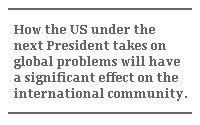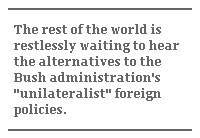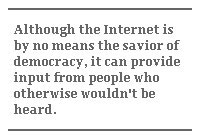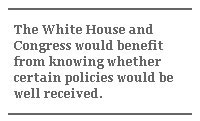Why Not a World Poll Before the US Election?
Why Not a World Poll Before the US Election?

TOKYO: "I have heard from people, foreign leaders elsewhere in the world who don't appreciate the Bush administration and would love to see a change in the leadership of the United States". So spoke Senator John Kerry at a fundraiser earlier this month as the two-horse race for the most powerful Presidential seat in the world swings into full gear.
While Kerry may be committing a serious error in aligning himself with leaders from the outside world - including his new and unlikely supporter, Kim Jong Il - he is correct in assuming that the rest of the world is awaiting the outcome of the US presidential elections with baited breath.
As the election campaign gains momentum, Kerry has made his criticisms of Bush's foreign policy clear, yet as far as Iraq, Afghanistan, and North Korea are concerned, Kerry's policies are seen by much of the world as only a paler shade of grey.

The options on offer from both candidates are few and the choices far between. This is not only a bad sign for the US but also for the rest of the world. World peace and the lives of 6 billion people on this planet hang on the outcome of the elections. How the US under the next President takes on the reconstruction of Iraq, tackles terrorist threats and nuclear non-proliferation, deals with Muslim societies, as well as with issues of trade and currency and the global environment, will all have a significant effect on the international community.
Under the current US-centered international system, the United Nations has been sidelined. Longstanding US allies like Britain and Japan have been relegated to a "coalition of the willing" (which has now lost Spain), while other major powers such as China and Russia are frantically trying to make "transactions" with the US. Now, no country has the power to effectively restrain America.
Such is the situation today that the rest of the world is restlessly waiting to hear the alternatives to the Bush administration's "unilateralist" foreign policies. Hopes are high that as November draws near, Kerry will be able to articulate the Democratic foreign policy options more clearly.
Charles Kupchan, professor at Georgetown University and author of "The End of the American Era", believes that since September 11th the system of checks and balances has broken down in the US. Internally, opposition parties have almost disappeared, and those expressing a dissenting view are few. Bush critics are condemned as unpatriotic, and only in the past four to five months have opponents of Bush's foreign policy begun to creep out from behind the rocks.

The problem exists internationally, too. No one wants to upset the US, which remains the biggest market for exports and largely controls multilateral financial institutions. Many foreign leaders feel obligated to measure their words when discussing US policy. Now, without even the United Nations to keep the US in check, the last hope is international public opinion.
If this is the case, why not give the citizens of the world a voice in the election of the next US president?
The idea is to hold a mock election via the Internet at individual discretion, giving everyone around the world with access to the Internet the chance to cast their vote. Voters would be able to choose the candidate they think is best for the world, giving reasons for their choice. The results should then be published before the real election on November 2, allowing US citizens to take world opinion into account when making their own decisions.
Although the Internet is by no means the savior of democracy, it can provide input from people who otherwise wouldn't be heard. There are currently an estimated 700 million internet users worldwide. Taking out the 200 million Americans who are now regular websurfers, that leaves half a billion people outside the US – including 200 million in Europe and another 230 million across Asia – who could take advantage of the internet to express their opinions on American policy. Worldwide, the number of web users has doubled in the past four years.

Impressive as these numbers may sound, though, web users obviously don't represent the views of all of their fellow citizens. However, the type of people connecting to the web also matters. In the developing world, particularly, internet users often include the educated economic and social elites who are traditionally responsible for shaping and evaluating their own countries' foreign policy. What these people think should matter to the US. Regardless of whose administration is in the White House, these are people that Washington and Wall Street have to work with in pursuing American interests overseas. They are the ones who are in unique positions to both shape and reflect public opinion in their countries.
Periodically taking the temperatures of the world's Internet users would not constitute a revolution in US policymaking. American politicians are used to relying on domestic opinion polls produced by Gallup and media organizations to gauge the political winds. The same practice could easily be extended beyond US borders. Of course, only US citizens have the right to vote politicians into or out of office, but for purposes of planning American foreign policy, it would be of immense benefit for the White House and Congress to know whether certain ideas would be well received. In the current absence of such data, Washington is forced to rely mainly on diplomatic elites, personal relations with individual foreign leaders, and intelligence agencies whose primary concern is (rightfully) national security.
This kind of initiative has already been established through a website called 'The World Votes' (at www.theworldvotes.org). Its founder, Wiebe de Jager, of the Institute for Multiparty Democracy at The Hague, described the basic idea behind his project:
"Nowadays there are many issues that go beyond national borders and national elections, but the international community is unable to fully engage in their discussion. 'The World Votes' recognizes that, in a post-9/11 era, US foreign policies affect countries and their citizens all around the world. With 'The World Votes', people all over the world now have the opportunity to let the US presidential candidates know what they expect of the head of the world's most powerful state."

The site, which encourages members of the international community to register their vote online, also conducts monthly opinion polls to determine world opinion on matters of international relations and US foreign policies. "We don't want to meddle in US internal affairs", de Jager stressed, and so far "most responses are quite positive".
As Kerry has alluded in his election campaign, however, there is always the danger that the results of a world poll such as this would be strongly anti-Bush. To avoid any misunderstanding, therefore, The World Votes categorically states it is "most certainly not intended to be an anti-America or anti-G.W. Bush platform". But, as one respondent to the website remarked, "the site name says it all: the entire world votes. If the outcome of these votes is anti-Bush, then that must mean that the world is truly anti-Bush".
Regardless, Americans deserve to know what the world thinks of their president, as he is their representative on the world stage. Likewise, the world deserves to be able to influence an election that will, in turn, influence their lives. An internet voting project could accomplish both, while promoting international dialogue about the politics that matters to everyone.
Yoichi Funabashi is a columnist and chief diplomatic correspondent for the Asahi Shimbun. He served as a correspondent in Beijing and Washington.